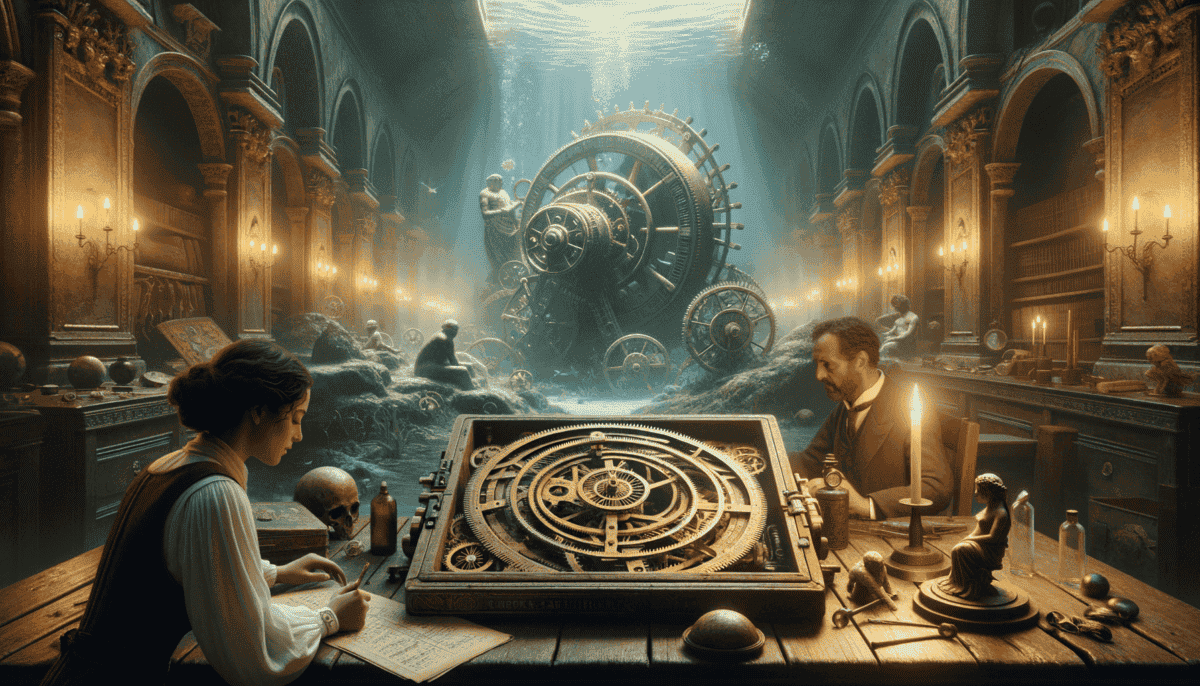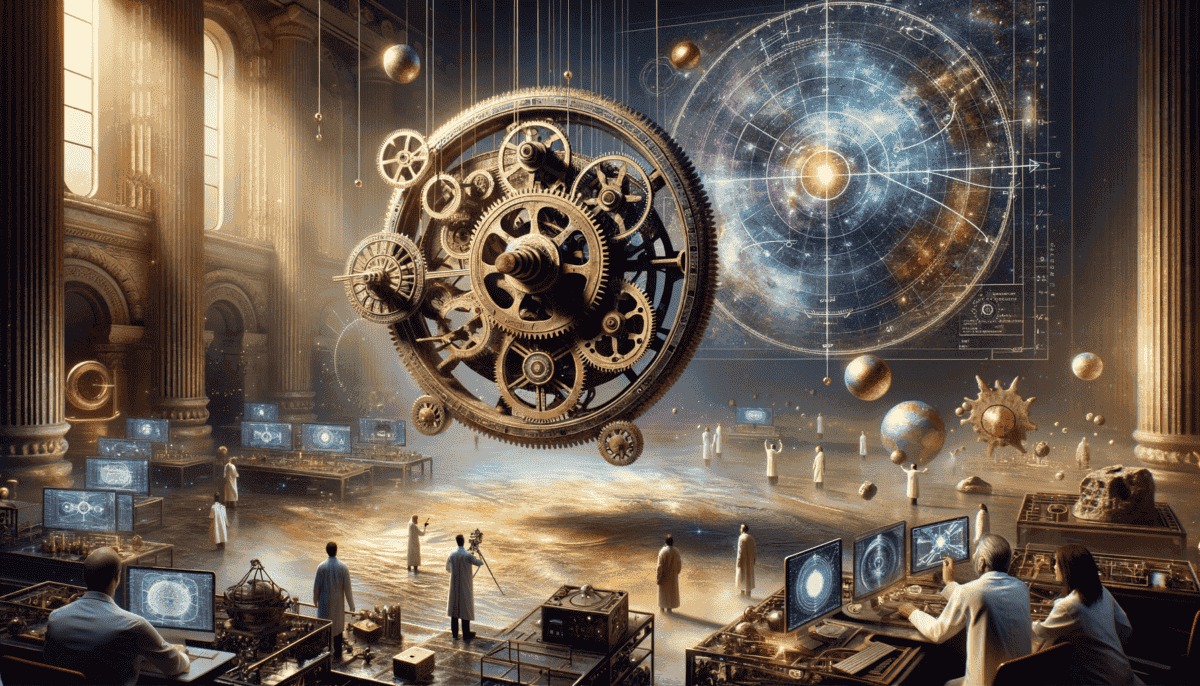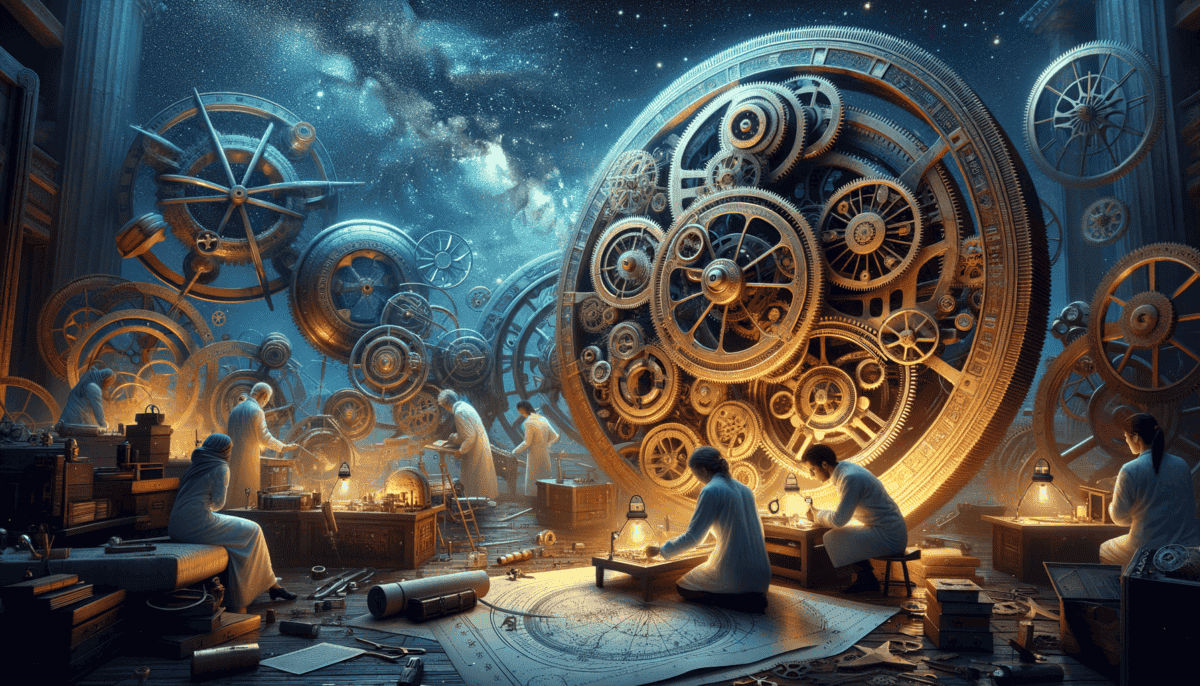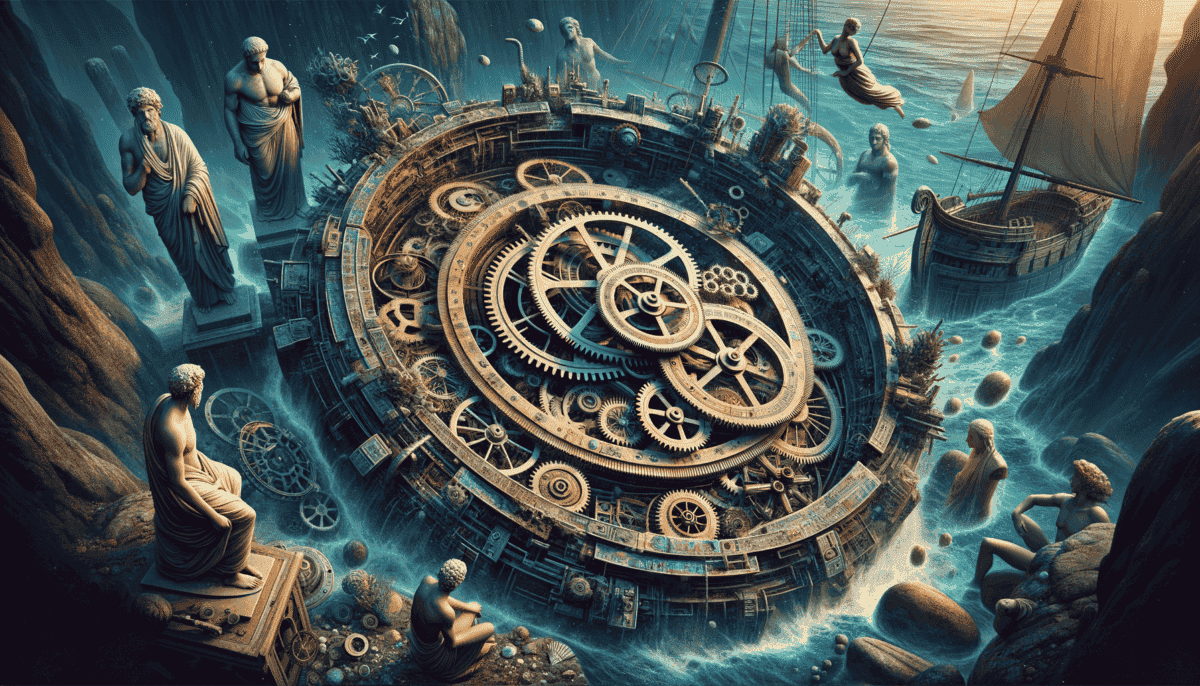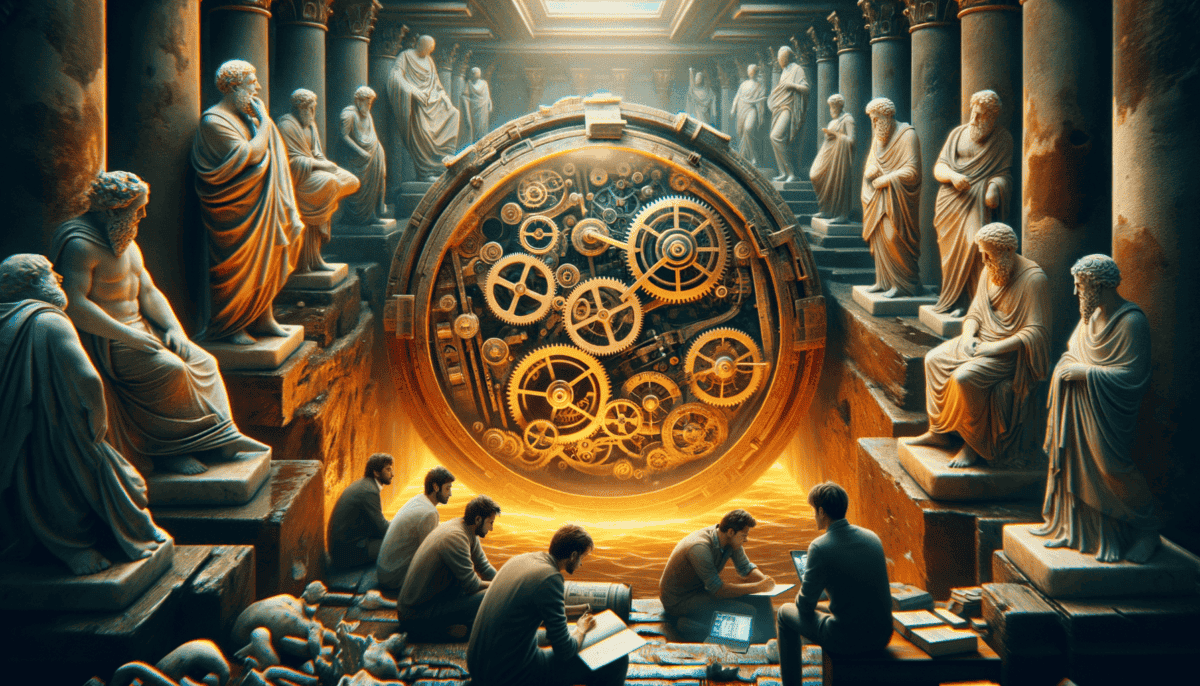The Unexpected Discovery
The warm Mediterranean sun sparkled on the blue waves as Stavros and his fellow sponge divers prepared their boat. It was just another day in 1901 near the small Greek island of Antikythera. Or so they thought.
"The water looks good today," Stavros said to his friend Dimitris, adjusting his heavy diving helmet. Their wooden boat gently rocked in the waves.
The divers didn't know it yet, but they were about to make one of the biggest discoveries in history.
As Stavros went deeper into the dark water, something caught his eye. It wasn't the usual sea sponges they were looking for. Through the murky water, he could see old pieces of wood and clay pots scattered on the sea floor.
"There's something down here!" his voice crackled through the air tube to the boat above. "I think it's an old shipwreck!"
Dr. Elena Papadopoulos, a marine archaeologist who happened to be nearby that day, rushed to the scene when she heard the news. Her eyes lit up with excitement as the divers brought up their strange finds.
"This is incredible!" she exclaimed, carefully examining a piece of corroded bronze they had found. "This isn't just any old shipwreck. These pieces are over 2,000 years old!"
Among the treasures they found that day was something very special – a mysterious lump of bronze covered in sea creatures and rust. Nobody knew what it was, but it would turn out to be an amazing ancient computer!
The divers kept bringing up more pieces. There were beautiful marble statues, old pottery, and more bits of the strange bronze thing. It was like finding a puzzle at the bottom of the sea!
“In all my years of diving, I’ve never seen anything like this,” Stavros said, shaking his head in wonder.
Dr. Elena carefully wrapped each piece they found in soft cloth. She knew these objects needed special care after being underwater for so long.
"We need to get these to Athens right away," she said. "The scientists at the museum will want to study them."
That night, as their boat headed back to shore, the team couldn't stop talking about what they had found. The mysterious bronze object seemed different from anything they had seen before.
Little did they know that this accidental discovery would change how we think about ancient Greek technology forever. Scientists would spend the next 100 years trying to figure out exactly what this strange machine could do.
As the sun set over the Aegean Sea, Stavros looked back at the spot where they had made their amazing find. What other secrets were still hiding in the deep blue waters? The adventure was just beginning.
The team's discovery would soon spark excitement all over the world. But for now, they carefully stored their precious cargo and sailed home under the starry Greek sky, wondering what mysteries tomorrow would bring.
A Scientific Mystery Begins
The strange bronze object from the sea arrived at the National Museum in Athens. Scientists gathered around it, scratching their heads. What could this ancient thing be?
"Look at all these tiny gears!" said Dr. Maria Kontou, wiping away some of the crusty sea stuff. Under the green coating, she could see metal wheels with small teeth.
Some people thought it was just an old clock. Others said it might be a toy. But Dr. Elena knew it was something much more special.
"The Greeks were very smart," she explained to her young assistant Tom. "They built amazing things we're still learning about today."
The scientists used special tools to look inside the mechanism without breaking it. What they saw made their jaws drop! Inside were lots of fancy gears, all working together like a puzzle.
"This is not just any old machine," Dr. Elena said excitedly. "It's like an ancient computer!"
But some older scientists didn't believe it. "That's impossible!" they said. "Ancient people couldn't make something so complicated."
Dr. Elena and her team worked hard to prove them wrong. They carefully cleaned each piece and took lots of pictures. They even used x-rays, just like doctors use to see your bones!
One day, Tom noticed something exciting. "Look!" he shouted. "There are tiny words carved on it!" The words were in ancient Greek, and they talked about stars and planets.
Dr. Elena smiled. "This proves it was used to study the sky," she said. "It's like having an ancient astronomy textbook!"
The team made a list of all the cool things they learned about the mechanism:
- It had at least 30 bronze gears
- It could track the moon's path
- It showed when eclipses would happen
- It even knew about leap years!
"But how did they make something so amazing?" Tom asked. Dr. Elena patted his shoulder. "That's what we're going to find out!"
Each day brought new discoveries. They found more pieces and learned more secrets. The ancient Greeks had created something really special – a machine that could calculate the mysteries of the sky!
The scientists worked late into the night, excited about what they might find next. The Antikythera Mechanism still had many secrets to share, and they were ready to unlock them all.
As they studied the ancient computer, one thing became clear: the people who lived 2,000 years ago were much smarter than anyone had thought!
Inside the Ancient Computer
Dr. Elena and Tom sat in their bright lab, looking at the amazing bronze machine. Special lights helped them see every tiny part.
“It’s like a puzzle box from long ago!” Tom said, his eyes wide with wonder.
Dr. Elena pointed to a round gear. “See these little teeth? They all work together, just like the gears in your toy cars.”
The team used a super special x-ray machine. It could see through the crusty metal and show what was hidden inside. What they saw was amazing!
“This isn’t just any old calculator,” Dr. Elena explained. “It’s like having the whole sky in a box!”
Tom looked confused. “But how does it work?”
Dr. Elena smiled and grabbed a piece of paper. She drew two circles with teeth, showing how they spin together.
“When you turn this wheel,” she said, moving her finger, “it makes the other wheel move too. The ancient Greeks used these to track the sun and moon!”
The scientists found out what made this computer so special:
- It could show where planets would be in the sky
- It knew when sports games would happen in ancient Greece
- It could tell you what phase the moon was in
- It even knew about the seasons!
“But Dr. Elena,” Tom asked, “how did they make such tiny gears without machines?”
“That’s what makes it so special,” she answered. “They were very careful and very smart. Each gear was made by hand!”
The team used new technology to help understand the old technology. They took thousands of pictures and made 3D models on computers. ️
“Look what I found!” shouted Tom one day. He pointed to tiny marks on one of the gears. They were numbers written in ancient Greek!
Dr. Elena clapped her hands. “Those numbers helped them know when special things would happen in the sky!”
“The ancient Greeks were like space scientists,” Tom said proudly. “They watched the stars and made this amazing machine to remember what they learned!”
Day after day, the scientists found new surprises. The ancient computer had more secrets than anyone thought possible!
Dr. Elena looked at her young helper with a smile. “Just think, Tom – we’re learning things that people forgot about for two thousand years!”
As the sun set outside their lab, Dr. Elena and Tom carefully packed up their tools. Tomorrow would bring new discoveries about this amazing ancient computer!
The more they learned about the Antikythera Mechanism, the more it showed just how clever ancient people really were.
Secrets of the Star Machine
The morning sun streamed through the lab windows as Dr. Elena studied a new set of X-ray images.
“Tom, come look at this!” she called excitedly. “We can see writing inside the machine!”
Tom rushed over, his eyes wide with wonder. “What does it say?”
“It tells us how to use the machine to track the stars and planets,” Dr. Elena explained. “Look at these special dials!”
“It’s like having an ancient space calendar!” Tom bounced with excitement.
Dr. Elena carefully turned one of the gears. As it moved, other parts spun too. She pointed to a golden dial.
“This part shows where the moon will be in the sky,” she said. “And this one tells you when eclipses happen!”
The team found out all the amazing things this ancient computer could do:
- Track the movement of five planets
- Show when the Olympics would happen
- Tell farmers when to plant crops
- Predict solar and lunar eclipses
- Show the phases of the moon
“But why did they need such a fancy machine?” Tom asked.
Dr. Elena smiled. “The Greeks loved to understand how the universe worked. This machine helped them feel closer to the stars.” ✨
Just then, Professor Zhang rushed into the lab. “You won’t believe what we found in the new scans!”
“There’s a whole section about tracking Venus!” he said, pointing to his tablet. “The ancient Greeks knew exactly how this planet moved!”
Tom picked up a gear and looked at it closely. “How did they make everything fit together so perfectly?”
Dr. Elena drew a picture showing how the gears worked together. “It’s like a puzzle where every piece has to be just right.”
The team worked late into the evening. They were making a computer model to show how the whole machine worked.
“Look!” Tom pointed at the screen. “When you turn this gear, everything moves just like the real stars!”
Dr. Elena nodded proudly. “The ancient Greeks were incredible engineers. They built a machine that could predict the future!”
“It’s like they put the whole sky into a bronze box,” Tom whispered in awe.
As they packed up for the day, Professor Zhang made an announcement. “Tomorrow, we’ll try to rebuild part of the machine!”
Tom couldn’t wait for tomorrow. Each day brought new discoveries about this amazing machine that tracked the stars!
The ancient computer still had many secrets to share, and the team was ready to find them all.
Sharing an Ancient Wonder
News of the amazing star machine spread fast! Scientists from all over the world came to see it.
“Look what we found!” Dr. Elena told a group of visitors. She pointed to the ancient computer behind its glass case.
Tom stood nearby, helping to show how the gears worked. He held up a model they had made.
“When you turn this wheel,” he explained, “it shows where the planets will be next month!”
A scientist from Japan raised her hand. “But how did they make it so long ago?”
Dr. Elena smiled. “We’re still learning! Every day we find new clues.”
The team had built several working models. Some were made of plastic, others of brass – just like the original.
“Making these models helps us understand how the ancient Greeks thought,” Professor Zhang explained.
One morning, a special package arrived. It was from a museum in London.
“They found more pieces of the mechanism!” Dr. Elena announced excitedly. “Now we can learn even more!”
The team carefully laid out the new pieces. They were tiny, but important.
Scientists used these tools to study the pieces:
- Special 3D X-ray machines
- Powerful microscopes
- Computer programs
- Digital cameras
- Laser scanners
“It’s like being a detective,” Tom said, looking through a microscope. “But our clues are 2,000 years old!”
Dr. Elena agreed. “And each clue tells us how smart the ancient Greeks were.” ⭐
The team made a special website to share their findings. People from around the world could see inside the ancient computer!
“Now everyone can learn about this amazing machine,” Professor Zhang said proudly.
Museums started asking for copies of the mechanism. They wanted to show people in their countries too.
Tom helped make videos showing how the machine worked. “It’s fun teaching others about our discovery,” he said.
One day, a group of young students visited the lab. Their eyes grew wide when they saw the mechanism.
“Can we build one?” a little girl asked.
Dr. Elena nodded. “That’s how we learn best – by trying to make things ourselves!”
“The ancient Greeks would be proud,” Professor Zhang said. “Their invention is still teaching us today!”
As more people learned about the star machine, new questions arose. What other amazing things did the ancient Greeks create?
The Future of Ancient Wisdom
The sun rose over the museum as Dr. Elena walked in. Today was special. The team was ready to share their biggest discovery yet!
“Look at this!” Tom called out. He pointed to a new computer screen. “We can now show exactly how the ancient Greeks tracked the stars!”
“It’s like having a time machine,” Dr. Elena said. “We can see what they saw 2,000 years ago!” ⭐
Professor Zhang walked in with a group of young students. Their eyes sparkled with wonder.
“Can you believe people made this without computers?” he asked them.
“Wow!” the children gasped. “They must have been really smart!”
- Build amazing machines
- Study the stars carefully
- Solve hard math problems
- Work together on big projects
- Think in creative ways
“The best part,” Tom said, “is that we’re still learning from them today!”
“Every time we study this machine, we find something new to be amazed about,” Dr. Elena added.
The team had made many copies of the star machine. They sent them to schools around the world.
A little boy raised his hand. “Will we find more ancient computers?”
Dr. Elena smiled. “Maybe! There could be more treasures waiting under the sea.”
Professor Zhang showed everyone a special video. It showed divers looking for more ancient treasures.
“The ocean is full of secrets,” he said. “We just have to find them!”
“And when we do,” Tom added, “we’ll learn even more about how smart our ancestors were!”
Dr. Elena looked at the ancient star machine one last time that day. She thought about all they had learned.
The ancient Greeks had built something amazing. Their wisdom still helped people today. And maybe, just maybe, there were more wonderful discoveries waiting to be found.


